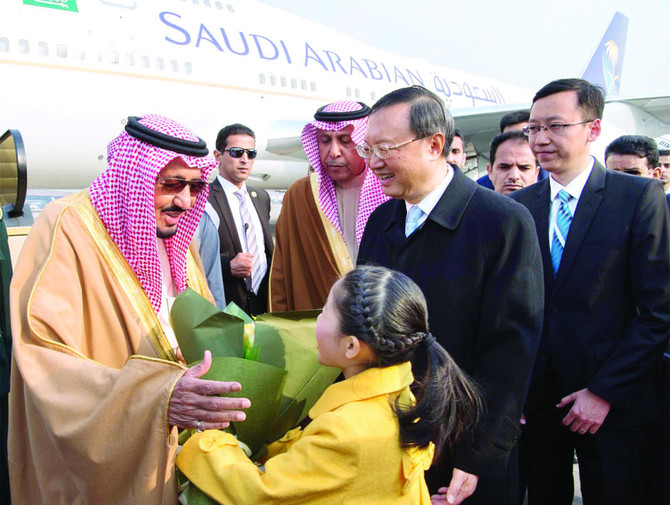 At the invitation of Chinese President Xi Jinping, Saudi Arabia’s King Salman is paying a state visit to China. The visit by the monarch, arguably the most strategically significant leg of his month-long Asia tour, comes as Riyadh has boosted its efforts to diversify the economy away from oil dependence, and broaden the Kingdom’s foreign partners.
At the invitation of Chinese President Xi Jinping, Saudi Arabia’s King Salman is paying a state visit to China. The visit by the monarch, arguably the most strategically significant leg of his month-long Asia tour, comes as Riyadh has boosted its efforts to diversify the economy away from oil dependence, and broaden the Kingdom’s foreign partners.
Although energy and trade will likely occupy an important place in the talks between the two leaders, the relations between both countries have expanded in various fields, especially in defense and security.
Energy cooperation remains the foundation of relations between Saudi Arabia, the world’s top exporter of crude oil, and China, the world’s biggest importer. China’s oil consumption has risen dramatically from 2.9 million barrels per day (mbpd) in 1993 to 11.90 mbpd in 2016. Thus, oil imports have also rapidly increased, rising from zero percent in 1993 to more than 66 percent of China’s total oil supply, or around 7.6 mbpd last year.
Importantly, the International Energy Agency (IEA) expects China’s appetite for crude oil imports to remain strong over the next decade, growing at an average rate of 2.4 percent over 2017-2022 to around 9.4 mbpd in 2022, with a possible additional 1.5-2 mbpd by 2030. In this context, Saudi Arabia will fight very hard to protect its growing energy interests in China.
Beyond oil, China also offers important economic advantages to Saudi Arabia’s sizeable downstream and petrochemicals sectors. Saudi Basic Industries Corp. (SABIC) already holds a stake in a polycarbonate complex in Tianjin with China Petroleum & Chemical Corporation (Sinopec Group), while Saudi Aramco holds a stake in the Fujian Refining & Petrochemical Company.
Against this backdrop the main concern for Riyadh is the future trajectory of China’s economy and the uncertainty over its oil demand. Growing competition is also an emerging challenge as Saudi Arabia is now facing competition for Chinese market share from Russia, Iraq, Iran, Venezuela and even Brazil.
Russia last year overtook Saudi Arabia to become China’s biggest crude oil supplier for the first time ever, shipping some 1.05 mbpd compared to Saudi Arabia’s 1.02 mbpd. Meanwhile, China’s petrochemical capacity is also projected to grow significantly over the coming years, while the yuan devaluation is reducing production costs and raising the price of imports. This situation would inevitably reduce the country’s reliance on imports.
Top trade partner
China’s rapid economic development over the past three decades contributed to a significant increase in its oil imports. In the process, Saudi Arabia become China’s top partner in the Middle East and North Africa (MENA). Looking forward, HSBC projects that China will remain the number one export market for Saudi Arabia to 2030, and will increase its dominance given its still relatively fast growth and demand for energy.
Today, more than 160 Chinese companies are operating in several sectors of the Saudi economy and the number of Chinese projects in the Kingdom reached around 175. The Chinese economic footprint in Saudi Arabia is most pronounced in the telecommunication and construction sectors. Huawei Technologies has a prominent presence in Saudi Arabia and represents one of the major success stories of Chinese companies in the Kingdom.
Yet China-Saudi relations are still transactional in their nature and have been restricted mainly to energy exports (oil, petroleum products and petrochemicals), Chinese manufacturing goods and limited cross-investment. To be sure, the trade between the two countries has dropped significantly to $42.4 billion in 2016, a decline of almost 18 percent from the previous year and nearly 40 percent since 2014, when the oil prices started to decline.
In this context lies the importance of the Saudi king’s visit to China, especially to attract more Chinese investment to the Kingdom and the use of Chinese expertise to contribute to the diversification of the Saudi economy away from oil.
Growing defense ties
Developing strategic relations with China is one of the most important foreign policy goals of Riyadh in the coming years. In January 2016, during President Xi Jinping’s state visit to Saudi Arabia, the two countries established a comprehensive strategic partnership.
From the Saudi perspective, Beijing could be regarded as a valuable source of political support as Saudi Arabia continues a path of selective economic reforms whilst also seeking to deflect Western pressure in the political arena. For example, last October China backed Saudi Arabia’s sovereign immunity and criticized the so-called Justice Against Sponsors of Terrorism Act (JASTA).
Counterterrorism is an emerging area of cooperation between the two countries. Last November, Riyadh and Beijing revealed a five-year plan for security cooperation including counterterrorism cooperation and joint military drills.
There is potential for Chinese companies to win more Saudi defense procurement over the next decade, particularly as Riyadh is seeking to diversify its military sources, and receive technology transfer as Riyadh aims ambitiously to localize over 50 percent of military equipment spending by 2030.
All in all, and despite several obstacles, Saudi-Chinese relations will be strengthened steadily in the future. Or as Chinese Foreign Ministry Spokeswoman Hua Chunying, during her regular press conference on March 13, put it: “We stand ready to take King Salman’s visit as an opportunity to take China-Saudi Arabia comprehensive strategic partnership to a higher level.”
• Dr. Naser Al-Tamimi is a UK-based Middle East researcher, political analyst and commentator with interests in energy politics and Gulf-Asia relations. Al-Tamimi is author of the book “China-Saudi Arabia Relations, 1990-2012: Marriage of Convenience or Strategic Alliance?” He can be reached on Twitter @nasertamimi and e-mail: [email protected].
















